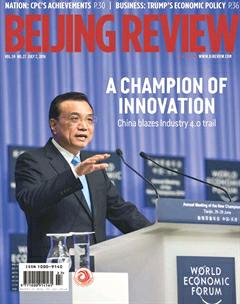Technology-Led Transformation
2016-07-27
The World Economic Forums Annual Meeting of the New Champions 2016, held in Tianjin on June 26-28, focused on the theme “The Fourth Industrial Revolution and Its Transformational Impact.”
Premier Li Keqiang attended the forum and delivered a keynote speech at the opening ceremony, pledging that the Chinese Government will push for innovation to stimulate growth, pursue a prudent monetary policy and adopt a market-driven approach to cut excess capacity.
Over 200 sub-forums were held on a range of topics, including the transformation of the global economy, with the participation of government officials, representatives of international organizations, business leaders and scholars from around the world.
Participants paid great attention to the shift in the industries that drive global economic growth. The shadow of the global financial crisis still looms large eight years on, resulting in a sluggish economic recovery. It appears that no industry is capable of spurring GDP growth itself. However, a new industrial revolution, fueled by information technology, biotechnology and new materials, has been taking place, increasingly making its presence felt upon the economy. For instance, e-commerce is transforming the retail industry and is shaping new consumer habits and trends.
The impact of Chinas economic transformation was also a topic for heated discussion. As the countrys economy becomes ever more globalized, there is an increase in mutual influence between China and the world. China has entered a “new normal” of slower growth and faces the task of industrial transformation and upgrading. Forum participants reached a consensus that short-term fluctuations are unavoidable, but that the Chinese economy has enormous potential and many favorable factors for a prosperous future.
A third important question at the forum looked at where the future of the world economy lies. Currently, the world is still riddled with floundering investment and trade growth, fluctuating commodity prices and volatile financial markets. Additionally, destabilizing factors are increasing, such as the diverging growth trends of developed countries and emerging countries. Moreover, the impending British exit from the EU has stoked up the uncertainties of an already unsettled global economy.
Premier Li prescribed three solutions for global economic recovery: structural reform, a commitment to transformations and upgrades, and the proper regulation of global governance. Hopefully, they will become the consensus of the international community and be turned into real action.
